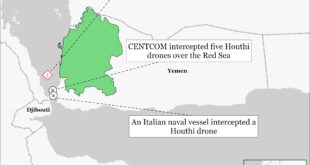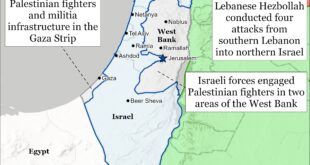Egypt’s long, troubled history with Palestinian refugees, along with failed attempts at “refugee blackmail,” make it politically impossible to open its border to all Palestinians in Gaza.
The Egyptian state has a long, troubled history of hosting Palestinian refugees, welcoming them, and subsequently restricting their rights according to the political whims of the day. But since Hamas’ attack and Israel’s indiscriminate bombing of Gaza, Egypt is balancing two geopolitical and moral dilemmas. First, preventing Palestinians from safe access to its territory is a violation of international law — and will almost certainly lead to more civilian deaths. Second, President Abdel Fattah el-Sisi and other Arab leaders do not want to be complicit in a permanent ethnic cleansing of Palestinians from Palestinian territory. Without any guarantees for their return, a humanitarian evacuation could mean that Palestinians will never go back to Gaza.
The United States and European Union are attempting to entice Egypt to allow Palestinians to evacuate to safety with a significant aid package. Egypt is unlikely to allow all 2.3 million Gazans to enter — but may find a way to evacuate Palestinians with American passports or other dual citizens. As a result, the majority of Palestinians will remain trapped in Gaza amid Israel’s bombings and impending land invasion. The attack on the hospital in Gaza on Oct. 17, 2023, which Hamas blames on Israel, also makes a larger deal politically impossible for Egypt. US diplomacy should focus less on bribing Egypt and more on demanding an immediate ceasefire so that the UN and the International Red Cross and Red Crescent can safely enter Gaza with food, water, fuel, and medical aid.
In the end, there are no military or humanitarian solutions to this crisis. The United States learned in Iraq and Afghanistan that military and counterterror operations did not bring about lasting peace and security. Humanitarian aid from the European Union or the United States might secure an evacuation plan of their dual nationals from Gaza, but it will not buy Arab allies and will only put a band-aid on 75 years of conflict and broken promises. The only path forward is a political solution: Israel and Hamas must agree to a ceasefire to stop the human suffering and reengage in the negotiated peace process.
Palestinians in Egypt
Palestinians in Egypt arrived in the tens of thousands beginning in 1948 with the creation of the state of Israel and the Nakba, or the mass displacement and dispossession of Palestinians. They then came in larger numbers after former President Gamal Abdul Nasser came to power in 1954 and allowed Palestinians from Gaza to enter the country. Additional refugees arrived after the 1967 war, during which Israel occupied the West Bank and Gaza, preventing many Gazans from returning to their homes. While the UN Relief and Works Agency for Palestine Refugees in the Near East (UNRWA) — the UN agency established to aid Palestinian refugees — did not provide services to Palestinians in Egypt, the Egyptian state under Nasser allowed Palestinians in Egypt to live much like citizens, with the ability to work and access state services. Rather than pure humanitarianism, these actions were part of a broader instrumentalization of the Palestinian cause and an attempt to project a unified Arab world under Nasser’s leadership.
Things began to change for Palestinians in Egypt after the 1973 Arab-Israeli War and the US-facilitated peace process between Egypt and Israel. After the Camp David Accords in 1978, and especially following the assassination of former Minister of Culture Yousef al-Sibai by a pro-Palestinian faction, Egyptian laws were amended under former President Muhammad Anwar el-Sadat to more markedly treat Palestinians as foreigners. They were excluded from state services, and Sadat removed their right to residency.
Humanitarian aid from the European Union or the United States might secure an evacuation plan of their dual nationals from Gaza, but it will not buy Arab allies and will only put a band-aid on 75 years of conflict and broken promises. The only path forward is a political solution: Israel and Hamas must agree to a ceasefire to stop the human suffering and reengage in the negotiated peace process.
While a sizable Palestinian community of somewhere between 50,000-100,000 individuals continues to reside in Egypt, they mostly live as an “invisible community,” often subject to political flareups, especially after the 2011 uprising and the 2013 military coup that ousted President Mohamed Morsi from power. The reinstated military regime accused Morsi of having placed his sympathies for the Palestinian cause before the Egyptian national interest. One of the criminal charges Morsi faced after his removal from the presidency was disloyalty to Egypt through collaboration with Hamas, as Morsi’s political party — the Muslim Brotherhood — is Hamas’ ideological parent organization. Rami Shaath, a Palestinian-Egyptian activist and founder of Egypt’s Boycott, Divest, Sanction (BDS) movement, was arrested and held for more than two-and-a-half years in pre-trial detention for his pro-Palestinian activism and on the trumped-up charge of being a member of Egypt’s Muslim Brotherhood.
Aid as a Failed Bargaining Tool
In recent years, Egypt has shown an increased willingness to engage in “refugee renterism,” by leveraging refugees to extract foreign aid. Scholars also refer to this as refugee blackmail or refugee commodification. The Egyptian leadership has been fairly successful at “blackmail” through the use of veiled threats without necessarily having to change the fundamentals of its laissez-faire migration and refugee policies. For example, the European Union dispersed $63 million as part of the European Trust Fund for Africa to fund seven projects in Egypt — most of which supported infrastructural development in some of the poorest parts of the country — in addition to funds from regional projects.
Another strategy for Egypt has been to tout an improbably high number of foreigners “in refugee-like conditions” residing in the country. The government claimed that 9 million were living in these conditions in 2022. The goal is to extract financial support from Europe and other international institutions and to justify closing its border to additional refugees. When Sudanese began arriving en mass six months ago, the European Union offered $21 million to help the Egyptian government receive them, in addition to the approximately $80 million the European Union had already offered at the end of 2022 to improve border management, search and rescue and anti-smuggling operations along the country’s north coast. In other words, these funds help contain refugees in Egypt and prevent them from attempting to travel to Europe. These aid packages are comparable to other draconian migration deals like the €5 billion (~ $5.3 million) 2015 EU-Turkey deal, the €60 million (~ $63 million) 2017 EU-Libya deal, the £120 million (~ $145 million) 2022 UK-Rwanda deal, or this summer’s €100 million ($105 million) EU-Tunisia deal. These agreements were all negotiated with the goal of stopping migrants and refugees from getting to Europe, but did little to improve conditions for migrants and refugees in host states.
With so much international attention on Egypt at the present moment, and the international community — particularly the United States and European Union — desperate to prevent the optics of mass carnage should a ground invasion of Gaza ensue, the Egyptian government could almost certainly extract a hefty aid package should it agree to host Palestinians. With Egypt in dire economic straits and unable to repay its International Monetary Fund debts, an aid package coupled with debt relief likely has its appeal. But humanitarian aid and refugee renterism will only go so far: Any deal with Egypt would only evacuate Palestinian-American citizens or other dual nationals, not the majority of Palestinians in Gaza.
A Game of Chicken
The Egyptian government is now playing a game of chicken with Israel, the United States, and the European Union, with Palestinians stuck in the middle. Israel dropped more than 6,000 bombs in six days, displacing one million Gazans. On Oct. 14, 2023, the military also ordered the evacuation of more than a million Palestinians from the northern half of the strip, with their only option to flee south. Ultimately, with Israel continuing to bomb the north and the south of the Gaza Strip, as well as a possible ground invasion, Egypt is under pressure to comply with international law — requiring that states cannot push people back into harm’s way — and allow at least some Palestinian civilians to enter its territory.
In addition, the attack on the hospital in Gaza complicates negotiations, making any deal with the United States politically untenable for Egypt because of domestic outrage over the killings. President Abdel Fattah El-Sisi, King Abdullah of Jordan, and Palestinian President Mahmoud Abbas canceled their summit with President Joe Biden this Wednesday in protest.
If Egypt does agree to accept Palestinians willing to leave Gaza, it may reportedly restrict them to a five-kilometer “buffer zone” near the border in the Sinai. But even for those who could enter Egypt, there is the added difficulty of their legal status and access to services once inside the country. Palestinians are traditionally not covered by the 1951 Refugee Convention and receive services from UNRWA, not the UN High Commissioner for Refugees. Once out of Gaza, delivering aid to Palestinians would be complicated.
The overarching imperative of international diplomacy should be to save lives. Egypt’s complicated history with Palestinians and the perceived security risks of hosting them mean that the el-Sisi government is unlikely to accept mass numbers of Palestinian refugees.
Furthermore, United States and European Union efforts to create a humanitarian corridor to evacuate civilians from Gaza must also secure guarantees about their right to return to Gaza, reclaim their property, and rebuild their lives and communities. Otherwise, a humanitarian evacuation will be complicit in the permanent ethnic cleansing of Palestine. As such, US efforts should move away from bribing Egypt into accepting Palestinians and toward brokering an Israeli-Hamas ceasefire.
 Eurasia Press & News
Eurasia Press & News




